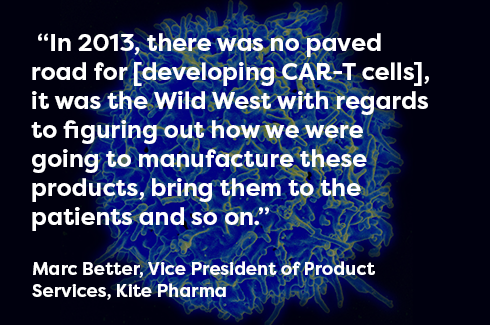'We really believe in the products we're making; their transformative nature and how they are going to potentially impact people's lives…The product is very effective at treating patients with previously untreatable lymphoma and we're very excited about bringing to the market a product to help these patients who really have no other therapeutic options at this point.'
At Biotech Week Boston (September 2017) we spoke to Vice President of Product Services Marc Better about Kite Pharma’s work on developing a new therapeutic modality using CAR-T cells to treat lymphoma and leukemia patients. Watch the exclusive interview or read the key takeaways below.
Starting out in the ‘Wild West’ of the CAR-T space
MB: 'When I started at Kite in 2013, there was no paved road for [developing CAR-T cells], it was the Wild West with regards to figuring out how we were going to manufacture these products, bring them to the patients and so on. All previous trials had been single institution studies where the patients go to the institution, they'll make a clinical product and treat the patient right there.’
RELATED ARTICLE: What is cell therapy?
‘We started working with an academic center at the National Cancer Institute in 2013. There were a handful of academic centers where patients were experimentally being treated, but what we started doing - and we were really the first people to do this - was figure out how to commercialize a product like that, take it out of an academic institution and bring it to a larger patient population…We had no clear regulatory path, no clear manufacturing path, so we really developed it internally.'
A fast-paced ‘paradigm shift’
MB: ‘We filed our first Investigational New Drug (IND) application in December 2014 and we started enrolling patients in our clinical trial in the early part of 2015. We were able to file a Biologics License Application (BLA) with the FDA in March 2017. So a little more than two years from the IND to the BLA.
It's really a remarkable path and I think the things that helped us along the way is the regulatory agencies - the FDA in the US and other counterparts worldwide - have been so enthusiastic about helping sponsors develop these new therapeutic options for patients. What we've been able to do independently, what we've been able to work through with the FDA and other organizations has just been remarkable.
I think when there's a potential paradigm shift in the way that patients can be treated, regulatory agencies are very enthusiastic about helping, so things have gone quickly…I think this whole idea of immunotherapy and a personalized medicine approach to treat cancer and other serious diseases is this paradigm shift.
Sponsors like Kite and others are really very interested in this approach, the government is very interested in this approach, the patients are interested in this approach. It is a sea change in the way we are able to treat people with really serious illnesses.'
Developing the final product
MB: ‘We collect the white blood cells from our patient with lymphoma through a standard hospital procedure called leukapheresis. That product is then sent to our central processing laboratory where we purify the mononuclear fraction - essentially the fraction that contains T cells from the individual.
We then start activating those cells so they'll grow in culture and we introduce the genetic element for the chimeric antigen receptor. It's a new molecule; we engineer the T cells so they express this protein on their cell surface, we grow those cells up until we have a therapeutic dose, then we wash those cells, freeze them and ship them back to the institution.
The treating physician will then infuse the patient with their genetically modified cells. Those cells then start growing in the body and they literally kill the tumor cells very rapidly. Usually within a month, if the products going to work in an individual, the CAR-T cells will kill the tumor and in many cases the patients will enjoy a complete response. Those complete responses in many cases are quite durable, so we're offering patients another option that potentially, with our fingers crossed, could be curative.'
RELATED ARTICLE: Next generation CAR-T cells - Dr Bruce Levine on-demand webinar

